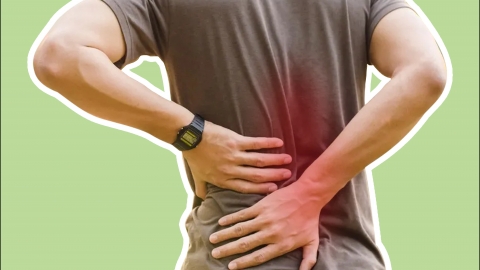What should I do about a herniated lumbar disc compressing a nerve?
Generally, nerve compression caused by lumbar disc herniation may result from prolonged poor posture, excessive load-bearing strain, degenerative lumbar spine changes, lumbar spinal stenosis, or spondylolisthesis. It is recommended to seek medical attention promptly, identify the underlying cause, and then improve symptoms under a doctor's guidance through conservative treatments, medications, surgery, and other methods. Specific causes are analyzed as follows:

1. Prolonged poor posture: Long-term bending, sitting, or standing places continuous stress on the lumbar spine, damaging the annulus fibrosus of the intervertebral disc and leading to nerve compression. This is often accompanied by lower back soreness and numbness in the lower limbs. Adjust daily postures to avoid slouching; use a lumbar support pillow when sitting for extended periods, and stand up to move around for 5–10 minutes every hour.
2. Excessive load-bearing strain: Regularly lifting heavy objects or sudden forceful lifting can place excessive pressure on the lumbar spine beyond its tolerance, resulting in disc herniation and nerve compression, often causing severe lower back pain. During the acute phase, bed rest for 1–2 weeks is advised, along with avoiding weight-bearing activities. After symptoms ease, wearing a lumbar brace can help protect the lower back.
3. Degenerative lumbar spine changes: With aging, intervertebral discs lose water content and elasticity, making them more prone to protrusion and nerve compression. This condition commonly affects middle-aged and elderly individuals and is often associated with radiating leg pain. Patients should follow medical advice to take medications such as ibuprofen sustained-release capsules, celecoxib capsules, or diclofenac sodium sustained-release tablets to relieve pain.
4. Lumbar spinal stenosis: The lumbar spinal canal narrows due to bone spurs or thickening of the ligamentum flavum, compressing the intervertebral discs and nerves, thereby worsening nerve compression. Symptoms include intermittent claudication and pain in the lower back and legs. Under medical guidance, patients may take medications such as mecobalamin tablets, vitamin B1 tablets, or etoricoxib tablets to nourish nerves and reduce inflammation.
5. Spondylolisthesis: Displacement of a lumbar vertebra alters the position of the intervertebral disc, further compressing nerves. Symptoms include limited腰部 movement, numbness, and weakness in the lower limbs. Mild cases can improve with bed rest, wearing a lumbar brace, and rehabilitation exercises. Severe cases may require surgical intervention—such as reduction and internal fixation for spondylolisthesis—to restore the vertebrae to their normal position, stabilize the spine, and relieve nerve compression.
In daily life, maintaining a healthy weight helps reduce stress on the lumbar spine, and avoiding strenuous exercise and overexertion is essential. Choose a mattress with moderate firmness to support the natural physiological curvature of the spine. Include adequate calcium and vitamin D in the diet to strengthen bones and support recovery of lumbar function, promoting overall spinal health.




